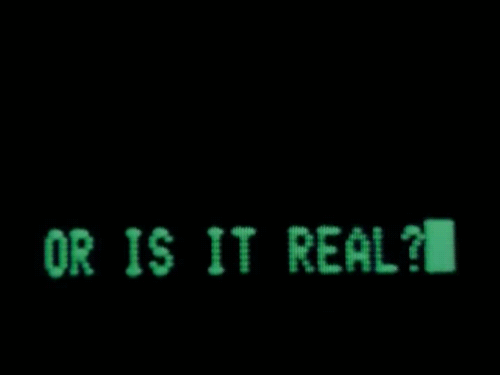How It Feels to Be Sometimes Inanimate
They say there’s nothing bad that can happen to a writer — that anything “bad” is really just “more material.” But there is something — besides the fact that obscene, horrific things do happen and being a writer doesn’t somehow make those things “not bad” when they happen to you — there’s something that can happen to a writer that precludes even the shitty catharsis of writing about it afterwards. It hasn’t happened to me — yet (I’m here writing about it aren’t I?) — but I’m convinced in could happen.
One can become convinced of the pointlessness of words themselves. Of their inadequacy, their futility. A sudden apprehension of how, under the guise of persuasion and understanding, they make things less (not more) real, push us into dissimilar currents, always further apart than when we started. Maybe if you’re smart you can imagine such a futility… and continued imagining is identical with believing. In fact I’m no longer sure that such thorough convincing of such thorough futility would be a catastrophe, which might tell you how close to the edge I’ve been swimming just now.
If we all turned into trees would it be a catastrophe?
What, for example, is “success”? What does it look like? Needs secured, all ambitions achieved, one supposes. But by that definition success looks very nearly the same as failure, doesn’t it? For failure is the end of ambition also. In both cases there is nothing left to achieve. So let’s redefine it then. “Success is a journey, not a destination: success is continuing to work in the cause of what you value.” But again, when we come across some process that seems bad or unfortunate to which this exact description would apply, then we call this same phenomenon “failure.” Success or failure, then, is just shorthand for what we think is “good” or “bad”, by which we really mean “fortunate” or “unfortunate”, all of which is just a guess unless you happen to be omniscient.
There is no failure or success. People do not succeed or fail, they only change. Success and failure are conditions which do not exist in the world; they are cartoons we project on people who are not us, including our past and future selves. Once you see one of these cartoons you start seeing them everywhere.
God is omniscient, although (as just about everyone realizes sooner or later) however Really Real God Is, we have no way of interacting with God save through the imagination. None whatsoever. If we take every word of the Bible as literally true then God The Personality is still absent except in the imagination. If we take Jesus to be a historical figure who really did rise from the dead, this living Jesus is still present only to an engaged imagination.
Of course we can (and always do, all the time) “imagine together”. We share images of some abstract thing with each other and even unconsciously try to visualize what other people are imagining about it. When you give someone else “write permissions” to your imagination, the effect is almost — or maybe even actually — supernatural.
When next you hear “god”, try substituting “our collective imagination”. It can be quite a revealing exercise, because very often that’s exactly what’s being referred to. But does this mean God is not real? Preposterous. I’ve just described God to you. Everyone has experienced God. Is the green I see the same as the green you see?1 Hard to say, but my guess is no.
Not “believing in” God is a lot like not believing in music — not meaning to say anything unkind about either belief or unbelief, actually. Music is real, of course, but what is it? A thing which affects us inside our own heads for a little while, like a Pavlov tone: while it plays we might seem to see the curtain of the universe pulled back, and to see the purposes and motives behind everything that happens — the success or failure towards which everything is tending — or to forget it all and abandon our nerves and our muscles to the electrochemical response — or maybe some mix of both. Music is real, and it is also nothing but the flutter of a gas and the complicated echo of that flutter in our heads. The music reveals nothing — it masks nothing.
So, some days, I find I don’t believe in success or failure, or in God or in music, but music is a really hard habit to shake. And for that matter I’m finding it very hard to believe in words any more, because words are essentially a very fussy genre of music, with lots and lots of rules and only seldom any pleasure. But if I had not the present luxury of living in a state of complete failure-success I would be a big believer in words, because words are how you arrange matter and bend the actions of people and bend your own actions to those of others. Words are how we succeed or fail; words are how we collectively imagine.
The truest words is, maybe, the noise of whatever is going on around you. This is the score or soundtrack of your short life, a little bit of noise and talking. Wherever you are, look up from this page and forget it.
-
This is actually the only theological question of any importance. ↩









